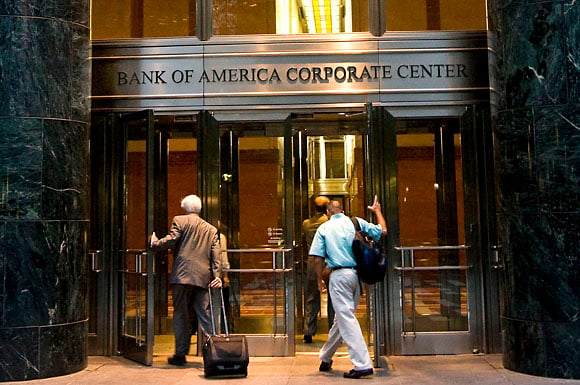Bank of America Corp. agreed to pay $137 million to settle investigations of its involvement in a conspiracy to rig bids on 88 municipal bond contracts, the U.S. Securities and Exchange Commission and Justice Department said.
Bank of America Corp. agreed to pay $137 million to settle investigations of its involvement in a conspiracy to rig bids on 88 municipal bond contracts, the U.S. Securities and Exchange Commission and Justice Department said.
Bank of America, based in Charlotte, North Carolina, agreed to pay $36 million to settle an SEC case. The bank will pay an additional $101 million to resolve investigations by other federal and state agencies, the SEC said.
Bank of America has been aiding a nationwide Justice Department probe since at least 2007 in return for leniency. The settlement also involves 20 states, the Office of the Comptroller of the Currency, the Internal Revenue Service and the Federal Reserve Bank, Connecticut Attorney General Richard Blumenthal said in a release.
The company’s “cooperation has led to an aggressive, ongoing investigation by the Department of Justice into anticompetitive activity in the municipal bond derivatives industry,” Christine Varney, who heads the Justice Department’s Antitrust Division, said in a statement.
“Bank of America is pleased to put this matter behind it and has already voluntarily undertaken numerous remediation efforts,” the company said in a statement.
Eight former bankers and financial advisers, including former employees of UBS AG, JPMorgan Chase & Co. and Bank of America, have pleaded guilty in connection with the probes.
Cost to Taxpayers
The conspiracy included more than 200 deals involving state agencies, local governments and nonprofit groups across the country, according to documents filed in federal court. The scheme may have cost taxpayers more than $1 billion, according to Steven Feinstein, a finance professor at Babson College in Wellesley, Massachusetts.
On Dec. 1, Peter Ghavami, the former co-head of UBS’ municipal derivatives group, was arrested as part of the four- year investigation after arriving in John F. Kennedy International Airport.
Ghavami, a Belgian national living in Moscow, faces a fraud charge tied to a $100,000 kickback for steering an investment agreement with a U.S. state to another bank.
Former JPMorgan banker James L. Hertz on Nov. 30 admitted to participating in bid-rigging and fraud conspiracies that delivered profits to Wall Street at taxpayer expense.
The Justice Department’s criminal investigation centers on investment agreements that municipalities enter with money raised through bond sales.
Guaranteed Contracts
The so-called guaranteed investment contracts let them earn a return until the cash is needed for schools, roads or other public works. The U.S. Treasury Department encourages competitive bidding to ensure that localities get market rates.
Prosecutors have said that favored bankers got inside information from brokers who handled bidding for the contracts so they could carve up the market. In some cases, bankers admitted paying kickbacks to brokers.
In September, Douglas Lee Campbell, a former municipal derivatives executive with the bank, pleaded guilty and agreed to cooperate. In May, Mark Zaino, who worked for UBS’s municipal bond and derivatives trading desk from 2001 to 2006, pleaded guilty to participating in a conspiracy to rig bids for the contracts.
Bank of America’s cooperation is an example of a Justice Department program under which the first company in a cartel to inform prosecutors about the illegal collusion is shown leniency. The program had been renewed on an annual basis until Varney earlier this year successfully lobbied Congress to extend the program until 2020.
“Any time you have a law that automatically sunsets every year, you create a lot of uncertainty,” she said in an interview last month. “If you’re a lawyer counseling a client, you’re not so sure you want to recommend that they take advantage of the leniency program when you’re not sure the leniency program is going to be there.”







